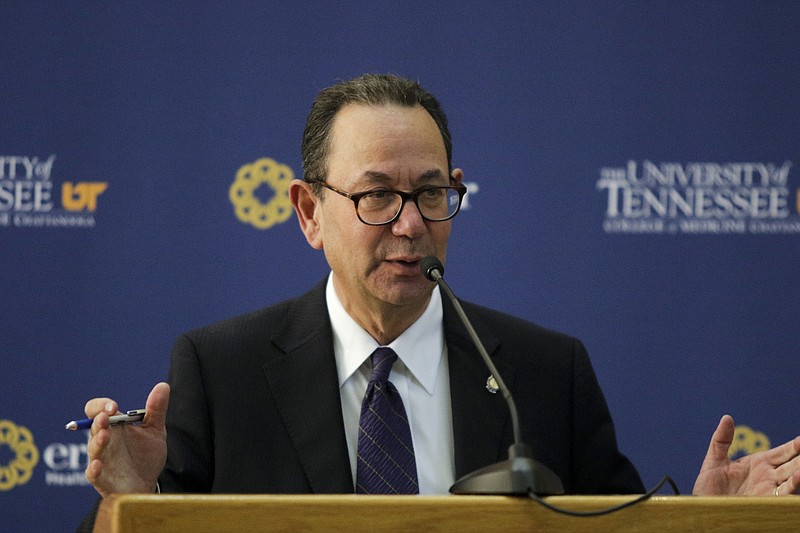Discussion about the potential exit of Erlanger Health System CEO Kevin Spiegel, which had been simmering behind the scenes for weeks, broke open Thursday in a hospital board meeting, but a decision on what to do about it was kicked down the road.
Although hospital issues that were cited in a May letter from the Medical Executive Committee have improved, according to board chairman Mike Griffin, some doctors are still unhappy with hospital leadership.
The meeting, at which many thought Spiegel's fate would be decided, didn't last long before board members decided no vote on the CEO would be taken. Three board members weren't present, trustee Gerald Webb said (though only one was absent and two were present by phone). The board chairman then opened the floor for others to speak.
Most of those who did speak expressed their appreciation for what the CEO has done in turning around the fiscal fortunes of the hospital, building a new children's outpatient center and expanding the health system's reach across the region.
Spiegel himself also spoke, touting Erlanger's achievements during his tenure in a lengthy address he might otherwise have given to Wall Street bond agencies considering whether to issue the hospital more bonds.
But Webb, while praising the hospital's revitalized place in the community, acknowledged that "foundational issues" needed to be addressed, "and the reality is we're not here this evening because everything is going well."
"I hate to see bad news," he said, "but sometimes the bad news is what is needed. Those conversations have to take place. And I think for a while we've had foundational issues, and we've had cracks starting to show."
Webb said he didn't know what it would take to repair and rebuild relationships, but he is concerned "some of them have been fractured beyond repair."
Trauma surgeon Philip Smith, similarly, said he loved the hospital and liked Spiegel and other administrators but said, generally, "there's something just not there."
"There is a lack of ingrained trust I can't put my finger on," he said, later adding "there's a distrust that's underlying everything here that needs to be addressed."
The meeting, exposing publicly what had been behind the scenes, and the resulting inaction now open the hospital and Spiegel to additional rumors, scrutiny and innuendo. Perhaps the coming weeks before the next public meeting of trustees (there have been several closed board meetings over the last month) will allow either further support for the current administration to become evident or will permit those who believe the hospital's problems are beyond surface deep to come forward.
To our thinking, the situation is better resolved sooner rather than later. Spiegel deserves that, hospital employees deserve that and the public - Erlanger is the county's only public hospital - deserves that.
Trustees need to determine if all the CEO has accomplished - and it is considerable - outweighs the not insignificant cracks that have occurred before those cracks turn into fractures.
We don't envy that determination because of what Spiegel has done and because the concerns of the Medical Executive Committee and others were not given without cause.
Spiegel, if Thursday's meeting is any indication, wants to keep his job.
"I would not like to see this unbelievable performance interrupted," he said. "I think the challenge is healthy. We want to see Erlanger go to the next level, and I'm prepared to lead that, and I want to see everybody here join me."
Yet, Spiegel, in enumerating the hospital's accomplishments and his own desire to serve, did not acknowledge problems facing the Erlanger, specifically the letter that Griffin referenced at the meeting's outset.
But if the CEO wants to go forward together with the hospital, as Griffin alluded they should if they are "on the same team," he must admit to a desire to, as Webb said, "repair and rebuild relationships."
We don't know if it's too late to do so or if it's possible. But we do think that since the internal struggles now are out in the open, it will be caustic to keep pushing the struggle down the road. The board should either 1) work out an exit strategy (which unfortunately could involve some hefty severance payout) with Spiegel or 2) immediately convene a separate committee or employ an arbiter or mediator to determine if the problems can be resolved.
If the problems cannot be resolved, the board would need to return to the first option. But the time for kicking a decision down the road should end.
